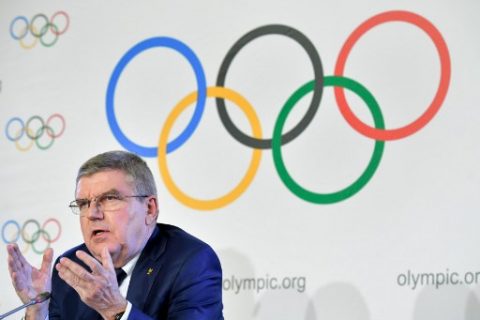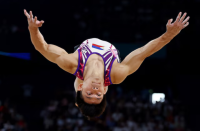
by Thibault Marchandet and Marina Lapenkova
Agence France Presse
MOSCOW, Russia (AFP) — The International Olympic Committee’s decision to ban Russia from the 2018 Winter Games over state-orchestrated doping has created an unprecedented split between the country’s athletes and politicians.
On Wednesday, President Vladimir Putin announced that Russia would not boycott next year’s Olympics in Pyeongchang, South Korea, nor would it prevent athletes from taking part.
It was a decision welcomed by IOC chief Thomas Bach and one that most Russian athletes had been hoping for.
But until the decision was announced, Russia’s political class had, almost in its entirety, railed against the ruling to exclude the sporting superpower from the February 9-25 competition, calling for a complete boycott.
Parliament’s deputy speaker Igor Lebedev, a sport fanatic who also sits on the Russian Football Union’s executive committee, said he felt the only solution in response to Tuesday’s IOC ban was a “complete refusal to take part in the Olympic Games.”
Vladimir Zhirinovsky, leader of the nationalist LDPR party, denounced what he called a “sporting and politically racist” decision, according to the RIA Novosti state news agency.
On VK, the Russian equivalent of Facebook, pro-Kremlin MP Natalia Poklonskaya — Crimea’s former chief prosecutor — said Russian athletes should parade only “under the flag of our great country”.
‘Dirty little political games’
Putin said last month that doping allegations against Russian athletes had been invented by the United States, a common theme among Russian officials.
“We are in favor of sport coming out of the realm of dirty little political games. We hope that this approach will prevail in Washington sooner or later,” said Deputy Foreign Minister Sergei Ryabkov, quoted by the TASS news agency.
The sentiment was echoed by foreign affairs spokeswoman Maria Zakharova, for whom the IOC decision is “a huge attack linked to the fact the political isolation of Russia has failed,” leaving the sporting world to deal with the repercussions.
But for many Russian athletes, forgoing the Olympics and sacrificing four years of hard work for nothing is simply inconceivable.
A squabble between Pyotr Tolstoy, deputy speaker of the Russian parliament’s lower house, and Yolanda Chen, a former triple jump world-record holder, illustrated the conflict between athletes and politicians.
‘Real traitors’
“The real traitors are those who haven’t lifted a finger to defend our athletes for two years,” Chen argued in a heated exchange on the Pervy Kanal TV channel, which broadcast the IOC decision live.
“It’s a confrontation without precedent between the politicians and athletes. It’s clear that the politicians are to blame… for the IOC decision, and now they’re trying to make traitors of those who are preparing to go to the Games,” Chen told AFP on Wednesday.
“They shout patriotism but we are the real patriots, not them. It’s us who are ready to go to the Games without a flag or anthem, to defend the honor of the nation,” she said.
This sentiment was shared by the large majority of athletes questioned by Russian media, as well as the country’s former Olympic stars.
“If I was in their place, I would go to the Games,” said double Olympic figure skating champion Evgeni Plushenko.
The three-time world gold medalist, now the coach of Sochi individual champion Adelina Sotnikova, added that he was “happy with the IOC decision, because it could have been worse.”
The number and identity of Russian athletes likely to compete in Pyeongchang next year will not be known until after a meeting of the national Olympic committee on December 12.
© Agence France-Presse






